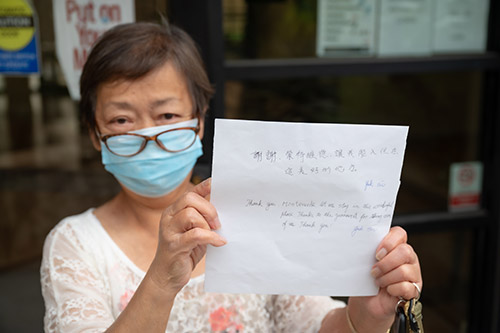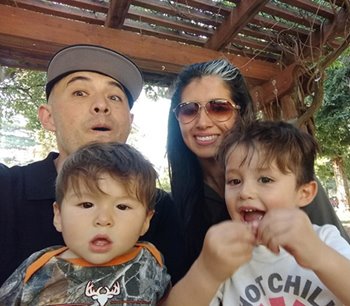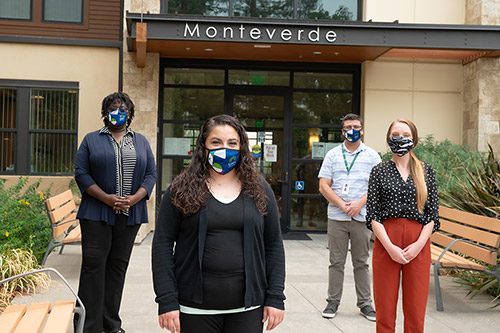"If there's a silver lining to the pandemic," says Daniela Ogden, Eden Housing's vice president of communications, advocacy and fund development, "it's this: Affordable housing works. Even as residents lose hours and jobs, those who live in Low-Income Housing, Tax Credit housing, or receive Section 8 or 202 housing vouchers, have remained stably housed. The programs, coupled with rent relief provided by Eden's Tenant Relief Fund, have given low-income residents one less thing to worry about."
Eden Housing's Tenant Relief Fund received a boost from NeighborWorks America's Rental Resilience Fund, which includes a significant grant from the Wells Fargo Foundation. "The initial disbursement went to 450 families," Ogden says. Eden Housing disbursed an additional $250,000 in December to ensure that residents didn't experience rent increases.
 Eden Housing is located in Hayward, California, but the organization has properties all over the state and manages 10,000 apartment units. Some of the people in those units saw their hours cut. Jobs disappeared. The amount of back-rent owed mounted. Ogden says they disbursed money in small increments and for a while, residents were able to pay. The extra government stimulus and unemployment money helped. But then things started shutting down again.
Eden Housing is located in Hayward, California, but the organization has properties all over the state and manages 10,000 apartment units. Some of the people in those units saw their hours cut. Jobs disappeared. The amount of back-rent owed mounted. Ogden says they disbursed money in small increments and for a while, residents were able to pay. The extra government stimulus and unemployment money helped. But then things started shutting down again.
Eden Housing continues to support residents in whatever way they can, and the assistance offer has a trickle-down effect. Kasey Archey, Eden's senior vice president of property operations, shares the story of an older resident who received rental assistance. That relief allowed her to help her daughter and grandchildren, who did not live in affordable housing and were on the verge of homelessness. "She could make sure they stayed housed as well," Archey says.
Another resident, Jose, says he lost his job early in the pandemic. "There are so many people who have lost everything," he says, "but the Tenant Relief Fund has allowed us to persevere."
In addition to rental relief, Eden Housing has seen a need for more resident services this year, particularly food, and they've worked to get groceries to residents. Smaller grocery bills have meant residents could put some of that money toward rent.
 The food and rental assistance helped curb some of the anxiety, Archey says. Still, mental health issues persist. Some of the people in the community who struggle with drugs or alcohol have relapsed, Archey shares. But residents continue to tell staff how much the assistance helps. "They've said we're more than their landlord; we're their community."
The food and rental assistance helped curb some of the anxiety, Archey says. Still, mental health issues persist. Some of the people in the community who struggle with drugs or alcohol have relapsed, Archey shares. But residents continue to tell staff how much the assistance helps. "They've said we're more than their landlord; we're their community."
The pandemic has also seen the resident services staff and property management staff working more closely together, and advocate, together, for residents. "It turns the mindset that everyone should have a place to live," Archey says. "Home is where your start is."
Staff have been intent on helping residents qualify for assistance, she says. And the assistance, in turn, gives residents room to figure out how to move forward. When the residents receive support, many try to do what they can to pay at least part of their rent. "They want to show initiative; to show good faith," says Archey. During the past 10 months, with support from the Tenant Relief Fund, Eden was able to maintain an average overall rent collection rate of 96%.
Eden Housing also received a grant from NeighborWorks' Critical Relief Fund, also supported by the Wells Fargo Foundation. That funding, too, went toward rental relief.
 Meanwhile, the organization continues to do welfare checks on residents and be there for the people who need them. Archey says that in resident services, they try to help residents fight isolation through virtual classes, sing-alongs from balconies, door decorating contests – anything to keep residents engaged.
Meanwhile, the organization continues to do welfare checks on residents and be there for the people who need them. Archey says that in resident services, they try to help residents fight isolation through virtual classes, sing-alongs from balconies, door decorating contests – anything to keep residents engaged.
And they continue to focus on what's next. Ogden says one thing the pandemic has made clearer than ever is the need to focus on the digital divide. Children go to school at home, she says. Their parents work from home. When they look at building new apartments in the future should broadband be part of the infrastructure?
"That's at the forefront for us," she says. "Do we want to make this a part of every building we build? We're incorporating the digital divide work into our goals. The lessons we're learning are informing what that will look like." Ogden says the organization's next fundraising effort will focus on ways to bridge the divide, something other NeighborWorks organizations, too, are examining, as they continue to do the work of ensuring residents' needs are being met.
01/27/2021

